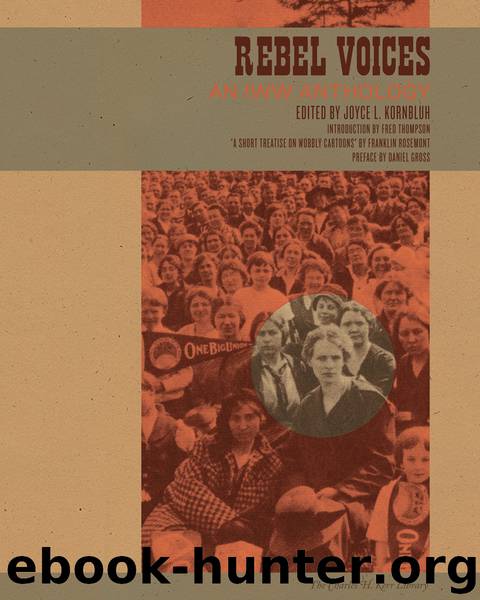Rebel Voices by Kornbluh Joyce L. Rosemont Franklin Thompson Fred Gross Daniel

Author:Kornbluh, Joyce L., Rosemont, Franklin, Thompson, Fred, Gross, Daniel
Language: eng
Format: epub
Publisher: PM Press
Published: 2011-11-23T16:00:00+00:00
Elizabeth Gurley Flynn addressing strikers in Paterson, 1913.
Brown Brothers photo.
The first period of the strike meant for us persecution and propaganda, those two things. Our work was to educate and stimulate. Education is not a conversion, it is a process. One speech to a body of workers does not overcome their prejudices of a lifetime. We had prejudices on the national issues, prejudices between crafts, prejudices between competing men and women,—all these to overcome. We had the influence of the minister on the one side, and the respect that they had for government on the other side. We had to stimulate them. Stimulation, in a strike, means to make that strike and through it the class struggle their religion; to make them forget all about the fact that it’s for a few cents or a few hours, but to make them feel it is a “religious duty” for them to win that strike. Those two things constituted our work, to create in them a feeling of solidarity and a feeling of class-consciousness,—a rather old term, very threadbare among certain elements in the city of New York, but meaning a great deal in a strike. It means, to illustrate, this: the first day of the strike a photographer came on the stage to take a picture, and all over the hall there was a quiver of excitement: “No, no, no. Don’t let him take a picture.” “Why not?” “Why, our faces might show in the picture. The boss might see it.” ‘Well,” I said, “doesn’t he know you are here? If he doesn’t know now, he will know tomorrow.”
From that day, when the strikers were afraid to have their pictures taken for fear they might be spotted, to the day when a thousand of them came to New York to take part in a pageant, with a friendly rivalry among themselves as to which one would get their picture in the paper, was a long process of stimulation, a long process of creating in them class spirit, class respect, class consciousness. That was the work of the agitator. Around this propaganda our critics center their volleys: the kind of propaganda we gave the strikers, the kind of stimulation and education we gave them. Many of our critics presume that the strikers were perfect and the leaders only were human; that we didn’t have to deal with their imperfections as well as with our own. And the first big criticism that has been made—(of course they all criticize: for the socialists we were too radical, for the anarchists we were too conservative, for everybody else we were impossible) is that we didn’t advocate violence. Strange as it may seem, this is the criticism that has come from more sources than any other.
I contend that there was no use for violence in the Paterson strike; that only where violence is necessary should violence be used. This is not a moral or legal objection but a utilitarian one. I don’t say that violence should not be used, but where there is no call for it, there is no reason why we should resort to it.
Download
This site does not store any files on its server. We only index and link to content provided by other sites. Please contact the content providers to delete copyright contents if any and email us, we'll remove relevant links or contents immediately.
| Anarchism | Communism & Socialism |
| Conservatism & Liberalism | Democracy |
| Fascism | Libertarianism |
| Nationalism | Radicalism |
| Utopian |
The Secret History by Donna Tartt(19088)
The Social Justice Warrior Handbook by Lisa De Pasquale(12190)
Thirteen Reasons Why by Jay Asher(8909)
This Is How You Lose Her by Junot Diaz(6887)
Weapons of Math Destruction by Cathy O'Neil(6279)
Zero to One by Peter Thiel(5802)
Beartown by Fredrik Backman(5754)
The Myth of the Strong Leader by Archie Brown(5507)
The Fire Next Time by James Baldwin(5444)
How Democracies Die by Steven Levitsky & Daniel Ziblatt(5218)
Promise Me, Dad by Joe Biden(5153)
Stone's Rules by Roger Stone(5088)
A Higher Loyalty: Truth, Lies, and Leadership by James Comey(4963)
100 Deadly Skills by Clint Emerson(4925)
Rise and Kill First by Ronen Bergman(4789)
Secrecy World by Jake Bernstein(4753)
The David Icke Guide to the Global Conspiracy (and how to end it) by David Icke(4718)
The Farm by Tom Rob Smith(4509)
The Doomsday Machine by Daniel Ellsberg(4490)
